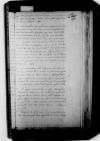Letter #5787
Alfonso de VALDÉS to Ioannes DANTISCUSs.l., [1526-10-31 — 1526-12-10 or 1527-01-26 — 1527-08-23 or 1527-10-18 — 1528-12-17 or 1529-04-18 — 1529-07-27?]
English register:
Looking through Pietro Martire’s letters before publication, Valdés has noticed nonsensical information in them about the Lutheran issue and the emperor’s coronation [in Aix-la-Chapelle, 1520]. He has suggested to the publisher [oeconomus] that he shouldn’t publish them, but the man has requested that Valdés make corrections or write them anew. Based on his old texts, Valdés has written a new version of the letters and sends them to Dantiscus requesting that he edit them.
Manuscript sources:
Auxiliary sources:
Prints:
| ||||||||||
Text & apparatus & commentaryPlain textText & commentaryText & apparatus
Salutem.
ms 2 Evolventi,
ms 1 Evolvente⌈Evolventims 2 Evolventi,
ms 1 Evolvente⌉ mihi
ms 1 oecono[mum] hidden by binding⌈oeconomumms 2 oeconomum,
ms 1 oecono[mum] hidden by binding⌉, ne huiusmodi ineptias ederet. Ille vero, existimans se  BK 222, No. 48, p. 200 nugis meis,
quas puer scripseram, decerpsi. Tu, si me amas, eas lege, relege,
corrige atque e barbaris Latinas facito. Absque
tuo calculo minime prodituras.
BK 222, No. 48, p. 200 nugis meis,
quas puer scripseram, decerpsi. Tu, si me amas, eas lege, relege,
corrige atque e barbaris Latinas facito. Absque
tuo calculo minime prodituras.
Vale.
[1] The religious situation in Germany and especially the interrogation of Martin Luther at the assembly in Worms in April 1521 was described in cf. Pietro Martire d' Anghiera, Opus epistolarum Petri Martyris Anglerii Mediolanesis, protonotarii apostolici atque a consiliis rerum Indicarum, nunc primum et natum et mediocri cura excusum, quod quidem praeter stili venustatem nostrorum quoque temporum historiae loco esse poterit, Alcalá de Henares, Miguel de Eguia, 1530 ⌊Opus epistolarum Petri Martyris Angleriicf. Pietro Martire d' Anghiera, Opus epistolarum Petri Martyris Anglerii Mediolanesis, protonotarii apostolici atque a consiliis rerum Indicarum, nunc primum et natum et mediocri cura excusum, quod quidem praeter stili venustatem nostrorum quoque temporum historiae loco esse poterit, Alcalá de Henares, Miguel de Eguia, 1530 ⌋, letters No. DCLXXXIX, DCCXXIII.
[2] The events during the coronation of Charles V as king of the Romans in Aix-la-Chapelle (Aquisgranum) in October 1520 were described in cf. Pietro Martire d' Anghiera, Opus epistolarum Petri Martyris Anglerii Mediolanesis, protonotarii apostolici atque a consiliis rerum Indicarum, nunc primum et natum et mediocri cura excusum, quod quidem praeter stili venustatem nostrorum quoque temporum historiae loco esse poterit, Alcalá de Henares, Miguel de Eguia, 1530 ⌊Opus epistolarum Petri Martyris Angleriicf. Pietro Martire d' Anghiera, Opus epistolarum Petri Martyris Anglerii Mediolanesis, protonotarii apostolici atque a consiliis rerum Indicarum, nunc primum et natum et mediocri cura excusum, quod quidem praeter stili venustatem nostrorum quoque temporum historiae loco esse poterit, Alcalá de Henares, Miguel de Eguia, 1530 ⌋, letter No. DCXCIX .

